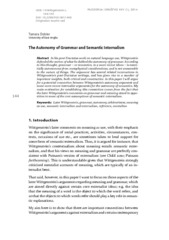Приказ основних података о документу
The contemporary significance of Wittgenstein's later philosophy
Savremeno značenje Vitgenštajnove kasne filozofije
| dc.contributor.editor | Sládeček, Michal | |
| dc.date.accessioned | 2017-11-01T10:16:26Z | |
| dc.date.available | 2017-11-01T10:16:26Z | |
| dc.date.issued | 2014 | |
| dc.identifier | 0353-5738 | |
| dc.identifier.uri | http://rifdt.instifdt.bg.ac.rs/123456789/652 | |
| dc.description.abstract | Editor’s Preface Reč priređivača The 125th anniversary of Ludwig Wittgenstein’s birth provides the occasion for the texts presented here. These articles, by mainly younger researchers, are a modest contribution to this anniversary. Despite the distance in time, if we judge according to Wittgenstein’s impact on contemporary philosophical production (his works span numerous subjects including questions of the limits of philosophy, the foundations of language and meaning, the problems of necessity, the existence of the external world and the nature of the mind and the self, as well as questions of religion, ethics and the significance of human existence), he is our contemporary and interlocutor maybe more than any other philosopher from the past. Wittgenstein’s thought is a subject of discussion not only in philosophical circles, but in those of the theory of literature, cognitive science, psychology, linguistics, anthropology, sociology and cultural studies as well. Wittgenstein’s’ influence on 20th century philosophy is immeasurable and it continues unceasingly into the 21st century. The articles presented here underwrite a continued interest in his philosophy manifested not only in the exegesis and interpretation of his work, but, above all, in scrutinizing the interconnections of Wittgenstein’s thought with relevant endeavours in current philosophy. Ken Shigeta elaborates Kripke’s skeptical argument in rule-following considerations as well as the possibility of its revision, which would make the argument compatible with Wittgenstein’s understanding of the paradox of interpretation. Tamara Dobler surveys the place of Wittgenstein’s understanding of the autonomy of grammar in the dispute between externalism and internalism. Finally, Michael O’Sullivan in his article analyses affiliations and differences between Wittgenstein’s and Quine’s understanding of the relation of language and meaning to the stimulus and the speaker’s environment. | eng |
| dc.format | 25 1 (2014) 125-179 | |
| dc.language | sr | |
| dc.rights.uri | https://creativecommons.org/licenses/by-nc-nd/4.0/ | |
| dc.source | Filozofija i društvo/Philosophy and Society | srp |
| dc.subject | Witgenštajn, Ludvig | |
| dc.title | The contemporary significance of Wittgenstein's later philosophy | eng |
| dc.title | Savremeno značenje Vitgenštajnove kasne filozofije | sr |
| dc.type | article | |
| dc.rights.license | BY-NC-ND | |
| dcterms.abstract | Савремено значење Витгенштајнове касне филозофије; | |
| dc.citation.spage | 125 | |
| dc.citation.epage | 179 | |
| dc.type.version | publishedVersion | |
| dc.identifier.fulltext | http://rifdt.instifdt.bg.ac.rs/bitstream/id/8058/0353-57381401144D.pdf | |
| dc.identifier.rcub | https://hdl.handle.net/21.15107/rcub_rifdt_652 |

